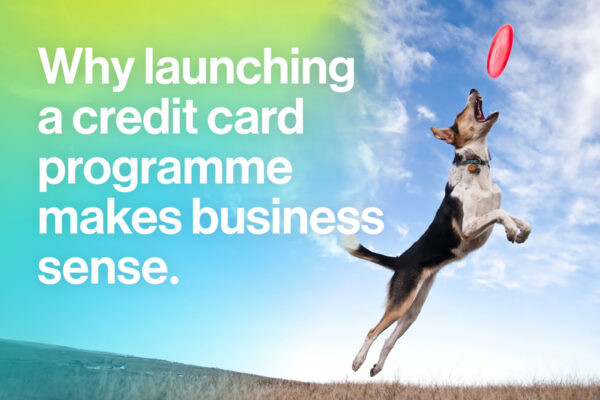Why banks and lenders need innovative card issuing systems to stay relevant.

In today’s fast-evolving financial landscape, standing still is no longer an option. Competitive pressure, tightening regulation and rising customer expectations are forcing financial institutions to rethink the infrastructure behind their core offerings, including how they issue and manage cards. A cloud-based architecture supports scalable business models and adapts to your changing needs.
Card issuing may have started as a back-office necessity, but it’s now a strategic control point. The decisions you make around issuing directly shape customer experience, product speed, compliance posture and margin. Yet, many institutions are still reliant on outdated and fragmented systems that create more obstacles than opportunities.
For banks, digital lenders and financial institutions across Europe, the time for innovative card issuing systems is now.
Why card issuing systems are under pressure.
The financial ecosystem is becoming more complex and more demanding. From PSD2 and AML to GDPR and real-time fraud obligations, regulatory compliance is intensifying. At the same time, cardholders expect digital-first experiences, instant approvals, flexible financing and post-purchase instalments and transparent repayment options.
Meanwhile, the business stakes are growing. Card programmes are no longer side products, they are central to revenue growth and customer retention. Institutions need to innovate continuously, optimise risk and scale across customer segments and geographies, all while protecting their brand.
But when the issuing platform can’t keep up, the whole operation suffers, from delayed launches and compliance bottlenecks to lack of oversight that increases operational and financial risk:
- You can’t launch new features quickly
- Your compliance team is overloaded with manual reporting
- Customer service is bogged down in dispute management
- Developers are stuck managing inflexible systems instead of building value
It’s a reality that many institutions face and a turning point they must navigate.
The hidden costs of legacy platforms.
Legacy issuing and processing systems weren’t built for today’s environment. Often developed for a single product type or geography, these platforms can’t support multi-product, multi-market operations. Changes to logic, fees or rules take months. Real-time adjustments are impossible.
The results are felt everywhere:
- Delays in launching new products, rewards or repayment options
- Revenue leakage from rigid fee models and poor transaction routing
- Operational inefficiency due to manual processes in fraud, collections and invoicing
- Limited visibility into key data, such as authorisation trends or delinquency risk
What’s worse, these issues are often accepted as “the cost of doing business.” But with the right infrastructure, they don’t have to be.
Rethinking issuing as a growth enabler.
Banks and lenders are increasingly treating issuing as a strategic function, one that demands agility, insight and full operational control. With an infrastructure partner like Enfuce, institutions can turn issuing into a foundation for long-term growth.
Here’s how upgrading your card issuing systems gives you an edge:
1. Speed to market, without shortcuts.
Whether you’re launching a new credit card, expanding into a new country or experimenting with co-branded propositions, agility is key. A flexible issuing processing platform enables fast deployment without compromising compliance.
Enfuce’s modular setup, integrated scheme access and BIN sponsorship services allow institutions to launch and scale at pace, with tools designed for speed, not complexity.
2. Built-in compliance across borders.
As a dual-regulated Electronic Money Institution (EMI), Enfuce ensures that compliance is embedded at every level. From PSD2 and PCI DSS to AML and SCA, all regulatory needs, as well as scheme mandates, are pre-configured and updated regularly.
You don’t need to build compliance from scratch, it’s handled for you, whether you’re operating in one country or ten.
3. Operational control where it matters.
Issuing success isn’t just about products, it’s about execution. With Enfuce, your teams can manage card lifecycles, configure billing logic, trigger fraud alerts and monitor repayments in real time through MyEnfuce, our intuitive operational portal.
No more vendor tickets. No more delays. Just the control you need to run efficient, compliant card operations.
4. Optimised revenue opportunities.
Cards are a revenue engine, if you have the tools to tune it. Enfuce supports layered monetisation: interchange, subscriptions, ATM fees, FX and more. With our real-time flexible ledger, you can tailor pricing models, repayment rules and interest logic per segment, market or product.
You decide how your programme earns and grows revenue without sacrificing customer value.
5. Customer experience that builds loyalty.
Issuing isn’t just infrastructure, it’s how your customers experience your brand every day. With Enfuce, you can offer:
- Real-time balance visibility and card management controls
- Customisable financing options, such as post-purchase instalments
- Flexible repayment options
- Clear, localised invoicing, reminder and collection (dunning) processes
These aren’t just features, they’re trust-building tools. The more transparent and empowering the experience, the more loyal your customers become.
What makes Enfuce different?
At Enfuce, we’ve reimagined issuing processing from the ground up. We offer banks and lenders a secure, scalable platform that combines speed, control and compliance, without the overhead of legacy systems. In fact, we were the first certified processor in the cloud and we’ve been building industry-shaping features ever since.
Our platform supports:
- Debit, prepaid and credit issuing, both for consumers and corporates, from a single, unified core
- Real-time APIs and operational dashboards
- Scheme access and BIN sponsorship for faster go-live
- Flexible ledger configuration for any repayment or pricing model
- Automated invoicing, reminders, collection and dispute flows
- Secure data exports and reporting for compliance and reconciliation
And we don’t just provide the technology. We partner with you on migration, onboarding and ongoing optimisation, drawing from deep experience with financial institutions across Europe. With our own background in banking, we understand your needs and challenges. We’ll craft out the most suitable solutions for you. You’ll always have top industry experts within your reach to guide you towards your goal – every step of the way, all the way. That way you can focus on your core business and user experience.
Why now is the moment to act.
Upgrading to an innovative card issuing system may feel like a daunting task. But the cost of delay is far greater. Every month spent on legacy infrastructure is a month of missed revenue, frustrated customers and rising risk.
With Enfuce, you can move fast, without chaos. Our structured seven-step migration process ensures a smooth transition, whether you’re moving 50,000 or 5 million cards..
And once you’re live, you’re not just compliant, you’re competitive.
Issuing is where strategy becomes real.
Your card programme isn’t just a product. It’s a daily touchpoint, a source of data, a revenue driver and a brand ambassador. But to unlock that potential, your issuing platform must be as dynamic as your market.
At Enfuce, we help institutions move from constrained to confident, with issuing processing infrastructure built for speed, compliance and control.
Ready to make innovative card issuing your next strategic advantage?



